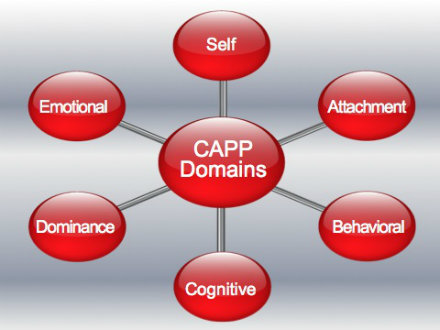
The Attachment domain reflects difficulties with interpersonal affiliation, such as the failure to form close, stable emotional bonds with others. It focuses on the intimacy and acceptance by others that people attempt to achieve in interpersonal exchanges.
The Behavioural domain reflects problems with the organisation of goal-directed activities, such as the tendency to be impulsive and sensation-seeking. It focuses on behaviour regulation, including the failure to establish adaptive strategies to deal with life tasks in a systematic, consistent or planned manner.
The Cognitive domain reflects problems with mental flexibility and adaptability, such as the tendency to be distractible, intolerant and suspicious. It focuses on mental actions and processes, including how the person focuses and allocates attention, encodes and processes information, organises thoughts and makes attributions.
The Dominance domain reflects difficulties with interpersonal agency, such as excessive status-seeking and assertiveness. It focuses on the degree of power or control that people try to take in interpersonal exchanges.
The Emotionality domain reflects problems with mood regulation, such as the tendency to experience shallow, labile emotions. It focuses on the tone, depth, and appropriateness of people’s affective responses.
The Self domain reflects problems with identity or individuality, such as being self-centred and self-aggrandising. It is concerned with people’s accurate consciousness of their own identities, including appreciation of their personality traits and schemas; and an appreciation of their salient abilities, qualities and desires. Additionally, the self influences social roles and relations with others

